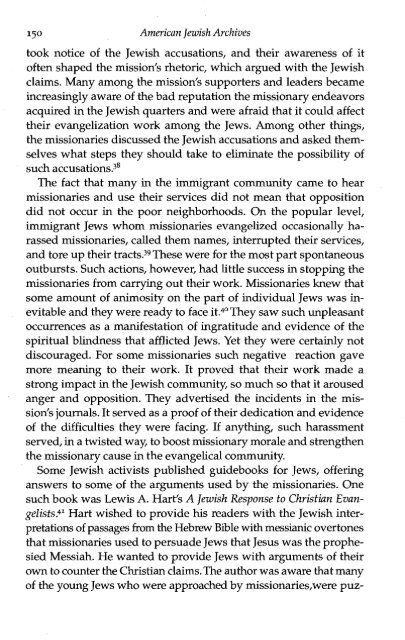Create successful ePaper yourself
Turn your PDF publications into a flip-book with our unique Google optimized e-Paper software.
150 <strong>American</strong> <strong>Jewish</strong> <strong>Archives</strong><br />
took notice of the <strong>Jewish</strong> accusations, and their awareness of it<br />
often shaped the mission's rhetoric, which argued with the <strong>Jewish</strong><br />
claims. Many among the mission's supporters and leaders became<br />
increasingly aware of the bad reputation the missionary endeavors<br />
acquired in the <strong>Jewish</strong> quarters and were afraid that it could affect<br />
their evangelization work among the Jews. Among other things,<br />
the missionaries discussed the <strong>Jewish</strong> accusations and asked them-<br />
selves what steps they should take to eliminate the possibility of<br />
such accu~ations.3~<br />
The fact that many in the immigrant community came to hear<br />
missionaries and use their services did not mean that opposition<br />
did not occur in the poor neighborhoods. On the popular level,<br />
immigrant Jews whom missionaries evangelized occasionally ha-<br />
rassed missionaries, called them names, interrupted their services,<br />
and tore up their tracts.39These were for the most part spontaneous<br />
outbursts. Such actions, however, had little success in stopping the<br />
missionaries from carrying out their work. Missionaries knew that<br />
some amount of animosity on the part of individual Jews was in-<br />
evitable and they were ready to face it.4' They saw such unpleasant<br />
occurrences as a manifestation of ingratitude and evidence of the<br />
spiritual blindness that afflicted Jews. Yet they were certainly not<br />
discouraged. For some missionaries such negative reaction gave<br />
more meaning to their work. It proved that their work made a<br />
strong impact in the <strong>Jewish</strong> community, so much so that it aroused<br />
anger and opposition. They advertised the incidents in the mis-<br />
sion's journals. It served as a proof of their dedication and evidence<br />
of the difficulties they were facing. If anything, such harassment<br />
served, in a twisted way, to boost missionary morale and strengthen<br />
the missionary cause in the evangelical community.<br />
Some <strong>Jewish</strong> activists published guidebooks for Jews, offering<br />
answers to some of the arguments used by the missionaries. One<br />
such book was Lewis A. Hart's A <strong>Jewish</strong> Response to Christian Evan-<br />
gelists?' Hart wished to provide his readers with the <strong>Jewish</strong> inter-<br />
pretations of passages from the Hebrew Bible with messianic overtones<br />
that missionaries used to persuade Jews that Jesus was the prophe-<br />
sied Messiah. He wanted to provide Jews with arguments of their<br />
own to counter the Christian claims. The author was aware that many<br />
of the young Jews who were approached by rnissionaries,were puz-

















